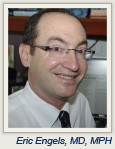Patients concerned about an increased risk of cancer among recipients of organ transplantation need to know that “in the great majority of cases, patients don’t get cancer,” according to Eric Engels, MD, MPH, lead author of the Transplant Cancer Match Study report and Senior Investigator, Division of Cancer Epidemiology and Genetics at NCI. “Patients who are on the wait list for a transplant know that transplantation is a potentially lifesaving therapy. They are eager to get a transplant, and that is the correct way to think about it,” Dr. Engels said. But these patients also need to think about ways to minimize their overall risks of cancer, “and that would be true both before and after the transplant,” Dr. Engels added.
Considerations involve general cancer reduction strategies, such as not smoking. Candidates for and recipients of organ transplants “should undergo routine screening for cancer based on their age,” Dr. Engels advised, such as cervical cancer screening and mammography for women and colon cancer screening for both men and women.
“Transplant recipients also have an increased risk for some virus-related cancers. So they should be evaluated for prevention and screening of those cancers,” Dr. Engels said. “They should get the hepatitis B vaccine if they are not already hepatitis B immune.”
Screening of Transplanted Organs?
Screening for recipients of transplanted organs, such as lungs, kidneys, and livers, where the study showed cancer is more likely to develop, “probably varies across the country, from transplant center to transplant center, but it is not a general part of clinical care to do screening,” Dr. Engels said. “I think that is something we would like people to consider. I don’t think we are at the point in our studies and analyses where we can strongly advocate for that, but I think the findings do raise it as a possibility.”
The risk for non-Hodgkin lymphoma risk was highest in the first year after transplants, then decreased and increased again to a plateau at 4.5 years after transplant. “There is no widely accepted way to screen those patients,” Dr. Engels said. “Some transplant centers screen people using a blood test for Epstein-Barr virus to look for evidence that the virus is reactivated. I think there is a recognition in the field that tests like that need to be further developed and standardized, and then they could be applied clinically.”■

 The Transplant Cancer Match Study,...
The Transplant Cancer Match Study,...